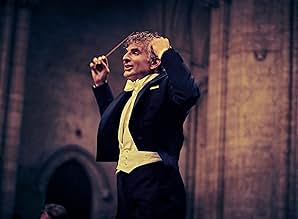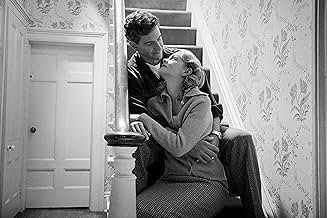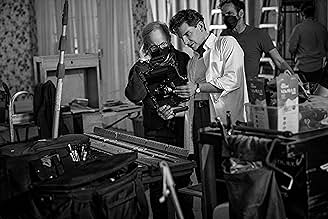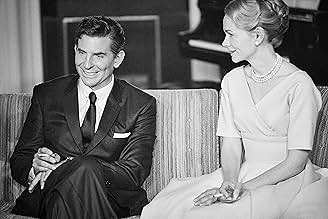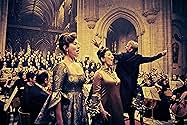This love story chronicles the lifelong relationship of conductor-composer Leonard Bernstein and actress Felicia Montealegre Cohn Bernstein.This love story chronicles the lifelong relationship of conductor-composer Leonard Bernstein and actress Felicia Montealegre Cohn Bernstein.This love story chronicles the lifelong relationship of conductor-composer Leonard Bernstein and actress Felicia Montealegre Cohn Bernstein.
- Nominated for 7 Oscars
- 27 wins & 180 nominations total
- Director
- Writers
- All cast & crew
- Production, box office & more at IMDbPro
Featured reviews
Obviously made for the Academy to truly honor Bradley Cooper remarkable transformation into the hoity toity world of Leonard Bernstein. Yes, we know he is going to be great in this role. But sometimes when you surround yourself with Oscar level material and talent, it could seem like it's just fishing for the Little Gold dude.
This is what it felt like. Though, simultaneously...he's just good.
Actor turned directors don't always work. Especially virtuosos that started clownish and end up in the serious zone. Cooper is that guy. Following in the footsteps of Clint Eastwood rather than, say Charles Laughton. It felt like a natural transition for Cooper who seemed to fine tune his energies towards more serious endeavors outside of things like "The Hangover" flicks.
"Silver Linings Playbook" was the start.
And who are his mentors in directing if it weren't the top tier directors.... David O' Russell, Paul Thomas Anderson, Spielberg, Scorsese or Clint Eastwood himself.
What this film struggles with, is the interest level. A lot will go over modern audiences head. Simply because we only know him as the guy who did the music to "West Side Story" And even THAT is stretching it. Cooper doesn't focus his energy on that rather this "love" story of a woman who fell for a gay guy. This would've been interesting 30 years ago. Now, not as intriguing.
Carey Mulligan is the best thing in this movie. At times, she is very much a Katherine Hepburn North Atlantic phony. But when some of the veil of her pain rises to the surface, she drops the pleasantries and tells it like it is.
There is a moment during a Thanksgiving party where we see some of the best acting I've seen between two people. Dialogue is somewhat on the nose, but boy do they both play it to the hilt. It's phenomenal, the ability to get to a screaming match with the words actually meaning something. That is an accomplishment.
Things get slow when the self-indulgent conducting moment creeps in. Yes, we know Brad studied a long time to get Bernstein's mannerisms. Do we really have to see all of it?
Other things that bothered me... it still feels like a very cold movie. Aside from Mulligan, his entire family seems to have been plugged in as trope characters to get you more understanding of the guy. They don't add much. Perhaps that was attempting to be subtle. It felt like subterfuge.
This was Oscar bait in absolute.
This is what it felt like. Though, simultaneously...he's just good.
Actor turned directors don't always work. Especially virtuosos that started clownish and end up in the serious zone. Cooper is that guy. Following in the footsteps of Clint Eastwood rather than, say Charles Laughton. It felt like a natural transition for Cooper who seemed to fine tune his energies towards more serious endeavors outside of things like "The Hangover" flicks.
"Silver Linings Playbook" was the start.
And who are his mentors in directing if it weren't the top tier directors.... David O' Russell, Paul Thomas Anderson, Spielberg, Scorsese or Clint Eastwood himself.
What this film struggles with, is the interest level. A lot will go over modern audiences head. Simply because we only know him as the guy who did the music to "West Side Story" And even THAT is stretching it. Cooper doesn't focus his energy on that rather this "love" story of a woman who fell for a gay guy. This would've been interesting 30 years ago. Now, not as intriguing.
Carey Mulligan is the best thing in this movie. At times, she is very much a Katherine Hepburn North Atlantic phony. But when some of the veil of her pain rises to the surface, she drops the pleasantries and tells it like it is.
There is a moment during a Thanksgiving party where we see some of the best acting I've seen between two people. Dialogue is somewhat on the nose, but boy do they both play it to the hilt. It's phenomenal, the ability to get to a screaming match with the words actually meaning something. That is an accomplishment.
Things get slow when the self-indulgent conducting moment creeps in. Yes, we know Brad studied a long time to get Bernstein's mannerisms. Do we really have to see all of it?
Other things that bothered me... it still feels like a very cold movie. Aside from Mulligan, his entire family seems to have been plugged in as trope characters to get you more understanding of the guy. They don't add much. Perhaps that was attempting to be subtle. It felt like subterfuge.
This was Oscar bait in absolute.
Think of a biopic of a famous person as like a complex cake - you can carefully dissect one slice of it to examine the contents, or you can bravely try to examine the whole lot to see what it's made of.
This biopic of American composer and conductor Leonard Bernstein is like looking at only the surface of the cake through a slice of Swiss cheese - a lot of loosely connected vignettes with no depth. If you don't know much about the man, you would leave the theatre with no great insights about him.
The film jumps around in time and gives you snippets of the man's life and work. There are scenes about his bisexuality and penchant for men, his role as a conductor and composer, his drug addictions and his relationship with his daughter, but none of these are examined in any depth at all. His bipolar relationship with his wife and her later death from cancer are given the most screen time, but still feels unfulfilled and lacking in substance.
Bradley Cooper directs in a rather disjointed style. The first half is shot in black and white, then we change to colour for no good reason except maybe historical chronology - it doesn't work. Neither does the curiously tight aspect ratio, which again inexplicably opens up to full screen near the end. Some scenes are beautifully shot but too often Cooper relies on the slow zoom in and the very long takes, which don't always seem to match the scene. The film also could have ended perfectly with the penultimate scene, but inexplicably ruins the moment with one extra shot that completely fails to land.
Carey Mulligan is excellent as Bernstein's wife but Cooper as Bernstein doesn't quite work for me. He tends to overact, gives you little insight into the man himself, and the nasal voice starts to grate after a while - maybe it was inevitable with the prosthetic nose he was required to wear.
Even the grand concert scene in the cathedral, conducting his beloved Mahler, didn't quite generate the depth of feeling it could have - contrast this with the Tchaikovsky concert scene in the French-Russian film Le Concert, which takes emotion (actors and viewers) to a much higher level.
All in all this is not a bad movie, and to be fair it does engage the viewer a little more in the second half. But it tackles too many themes with a disturbing superficiality, giving very little substance to almost any. It could have been a lot better. No doubt however it will get lots of Oscar nominations, but then the Academy lost the plot years ago and succumbs to hype more than merit.
This biopic of American composer and conductor Leonard Bernstein is like looking at only the surface of the cake through a slice of Swiss cheese - a lot of loosely connected vignettes with no depth. If you don't know much about the man, you would leave the theatre with no great insights about him.
The film jumps around in time and gives you snippets of the man's life and work. There are scenes about his bisexuality and penchant for men, his role as a conductor and composer, his drug addictions and his relationship with his daughter, but none of these are examined in any depth at all. His bipolar relationship with his wife and her later death from cancer are given the most screen time, but still feels unfulfilled and lacking in substance.
Bradley Cooper directs in a rather disjointed style. The first half is shot in black and white, then we change to colour for no good reason except maybe historical chronology - it doesn't work. Neither does the curiously tight aspect ratio, which again inexplicably opens up to full screen near the end. Some scenes are beautifully shot but too often Cooper relies on the slow zoom in and the very long takes, which don't always seem to match the scene. The film also could have ended perfectly with the penultimate scene, but inexplicably ruins the moment with one extra shot that completely fails to land.
Carey Mulligan is excellent as Bernstein's wife but Cooper as Bernstein doesn't quite work for me. He tends to overact, gives you little insight into the man himself, and the nasal voice starts to grate after a while - maybe it was inevitable with the prosthetic nose he was required to wear.
Even the grand concert scene in the cathedral, conducting his beloved Mahler, didn't quite generate the depth of feeling it could have - contrast this with the Tchaikovsky concert scene in the French-Russian film Le Concert, which takes emotion (actors and viewers) to a much higher level.
All in all this is not a bad movie, and to be fair it does engage the viewer a little more in the second half. But it tackles too many themes with a disturbing superficiality, giving very little substance to almost any. It could have been a lot better. No doubt however it will get lots of Oscar nominations, but then the Academy lost the plot years ago and succumbs to hype more than merit.
I was very excited when I heard Maestro was coming out. With all this filmmaking firepower, it would have to be worthy of its subject. Now I've seen the movie and am stunned by the wasted talent and energy expended for what turned into another movie about rich, talented people who appear to have it all, but get sad and emotional just like the rest of us. They just talk about it a LOT more.
The film is beautifully photographed, but I have no idea what the format change and the black and white to color change accomplished. The acting was good, but rather than being shown that the characters are going through something emotional, we are told, All these immensely talented people seem to talk about is their feelings, not their motivations, plans and aspirations.
Leonard Bernstein wrote and conducted some of the most memorable music of the 20th century. He singlehandedly (with help from Bugs Bunny) kept interest in classical music alive when jazz and rock were kings. But we learn nothing of this in this film. Bernstein's talents and accomplishments are presented as facts, without exploration. What a waste.
The film is beautifully photographed, but I have no idea what the format change and the black and white to color change accomplished. The acting was good, but rather than being shown that the characters are going through something emotional, we are told, All these immensely talented people seem to talk about is their feelings, not their motivations, plans and aspirations.
Leonard Bernstein wrote and conducted some of the most memorable music of the 20th century. He singlehandedly (with help from Bugs Bunny) kept interest in classical music alive when jazz and rock were kings. But we learn nothing of this in this film. Bernstein's talents and accomplishments are presented as facts, without exploration. What a waste.
I went to Maestro expecting a film that would chronicle the life of one of America's, if not the world's, great composer/conductors. I've seen Leonard Bernstein many, many times, starting at age 8 when my grandfather took me to Bernstein's music for kids on Saturday mornings at Lincoln Center. I had no idea who he was at the time, only that people called him Lenny. My grandpa took me to meet him and he was spellbinding. I remember him looking right threw me with his expressive eyes.
He loved kids and loved to teach them about music. Turns out grandpa and Lenny went to Harvard together, hence I got a personal introduction. Bernstein is the guy that got me hooked on classical music and music in general, but I didn't learn anything about his musical career, his childhood, his years at Harvard, his work in Europe, who inspired him, etc.
The making of West Side Story is really interesting (if you know the story) but nothing about it in this film and I mean "nothing.; We get a tiny glimpse of Candide, but nothing about its composition or insight into the Maestro's process. We get zero insight into his Missa Brevis, perhaps on the highlights of his career.
Bradley Cooper blew me away. I've seen Lenny up close many times and I've talked to him a few times. Cooper nailed it, and the scene at St John of the Divine is probably one of the greatest musical scenes ever captured on film. Cooper's conducting is simply amazing. He worked very very hard to capture the speech, mannerisms, and the Bernstein attitude and texture toward music. I cannot speak highly enough of Cooper's performance, but we get so little insight into the musician, and that was so disappointing.
Carey Mulligan? Her performance is nothing less than spectacular, in fact all the acting is extraordinary, but it's not a story. The Bernstein children really have nothing to do in this film, and I have no idea why Lenny's sister was included as she has very little to say or do. Overall, a very perplexing film ... not sure what he was going for. In fact, I kept waiting for it to start. The emphasis was all on style, and believe me, it's beautiful to look at.
He loved kids and loved to teach them about music. Turns out grandpa and Lenny went to Harvard together, hence I got a personal introduction. Bernstein is the guy that got me hooked on classical music and music in general, but I didn't learn anything about his musical career, his childhood, his years at Harvard, his work in Europe, who inspired him, etc.
The making of West Side Story is really interesting (if you know the story) but nothing about it in this film and I mean "nothing.; We get a tiny glimpse of Candide, but nothing about its composition or insight into the Maestro's process. We get zero insight into his Missa Brevis, perhaps on the highlights of his career.
Bradley Cooper blew me away. I've seen Lenny up close many times and I've talked to him a few times. Cooper nailed it, and the scene at St John of the Divine is probably one of the greatest musical scenes ever captured on film. Cooper's conducting is simply amazing. He worked very very hard to capture the speech, mannerisms, and the Bernstein attitude and texture toward music. I cannot speak highly enough of Cooper's performance, but we get so little insight into the musician, and that was so disappointing.
Carey Mulligan? Her performance is nothing less than spectacular, in fact all the acting is extraordinary, but it's not a story. The Bernstein children really have nothing to do in this film, and I have no idea why Lenny's sister was included as she has very little to say or do. Overall, a very perplexing film ... not sure what he was going for. In fact, I kept waiting for it to start. The emphasis was all on style, and believe me, it's beautiful to look at.
A struggling musician agonized by his own genius, talents, and creativity and trapped in loveless marriage filled with guilt. Both look the other way while one has an affair and realize the importance of one's own partner too late. Right now, at the top of my head I can think of 'Fosse/Verdon', 'A Star Is Born', 'George & Tammy', 'Walk the Line', 'Dreamgirls', 'Daisy Jones & The Six', and etc. (Wow, that's a lot.) Biographical genre is especially tricky because it has to excel the life of actual historical figures. 'Maestro' could have been so much better if it delved into the introspective and artistic side of Bernstein deeper or provided a different and fresh point of view on his life rather than reciting his personal life. His autobiography or research would be more fun and interesting than this explanatory movie.
There were a few futile attempts to make the movie look more artistic, abstract, and ambiguous. They failed because they serve no purpose but to look pretentious. White and black, camera movement, the use of light and shadows, and musical aspects. They are all good attempts, but for what? By doing so, is the story getting stronger? Do they enhance what viewers feel? Waste of time and films.
Bradley Cooper's performance is disappointing. He never acts; he imitates. When he's on the screen, we know clearly that he's acting. It's hard to be absorbed and immersed into the screen because he always pushes the audience away with his trying too hard. I get that he wants to emulate Bernstein's twangy voice. However, emotions and messages he delivers are more important than his likeness of Bernstein's tone, accent, sound, or mannerism. He focuses on what's outside of Bernstein rather than what would be inside of him. There is a 10 minute sequence of Cooper conducting, and it's screaming 'Look how good I am!!!'. It's one of the highest points for emotions to burst out for the audience, and I started to laugh.
There were a few futile attempts to make the movie look more artistic, abstract, and ambiguous. They failed because they serve no purpose but to look pretentious. White and black, camera movement, the use of light and shadows, and musical aspects. They are all good attempts, but for what? By doing so, is the story getting stronger? Do they enhance what viewers feel? Waste of time and films.
Bradley Cooper's performance is disappointing. He never acts; he imitates. When he's on the screen, we know clearly that he's acting. It's hard to be absorbed and immersed into the screen because he always pushes the audience away with his trying too hard. I get that he wants to emulate Bernstein's twangy voice. However, emotions and messages he delivers are more important than his likeness of Bernstein's tone, accent, sound, or mannerism. He focuses on what's outside of Bernstein rather than what would be inside of him. There is a 10 minute sequence of Cooper conducting, and it's screaming 'Look how good I am!!!'. It's one of the highest points for emotions to burst out for the audience, and I started to laugh.
Did you know
- TriviaOf the scene in which Leonard Bernstein conducts the London Symphony Orchestra at the Ely Cathedral in 1976, Bradley Cooper said, "That scene I was so worried about because we did it live... I was recorded live. I had to conduct them. And I spent six years learning how to conduct six minutes and 21 seconds of music. I was able to get the raw take where I just watched Leonard Bernstein [conduct] at Ely Cathedral... And so I had that to study."
- GoofsThe day after Bernstein makes his wildly successful debut with the N.Y. Philharmonic in November of 1943, the story is carried on the front page of the N.Y. Times. One of his friends notes that the front page also includes a headline reading "Hitler Bombs Poland." Germany had bombed and conquered Poland in September, 1939, so the country had already been under German occupation for over four years at the time of Bernstein's debut concert.
- Quotes
Leonard Bernstein: Summer sang in me a little while, it sings in me no more. Edna St. Vincent Millay.
Felicia Montealegre: If the summer doesn't sing in you, then nothing sings in you. And if nothing sings in you, then you can't make music.
- ConnectionsFeatured in Chris Plante: The Right Squad: Episode #1.70 (2023)
- How long is Maestro?Powered by Alexa
Details
- Release date
- Countries of origin
- Official site
- Language
- Also known as
- Rybernia
- Filming locations
- Production companies
- See more company credits at IMDbPro
Box office
- Budget
- $80,000,000 (estimated)
- Gross worldwide
- $383,532
- Runtime2 hours 9 minutes
- Color
- Sound mix
- Aspect ratio
- 1.33 : 1
Contribute to this page
Suggest an edit or add missing content








